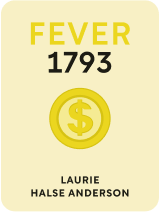

This article is an excerpt from the Shortform book guide to "Fever 1793" by Laurie Halse Anderson. Shortform has the world's best summaries and analyses of books you should be reading.
Like this article? Sign up for a free trial here .
What happens at the end of Fever 1793? Does Philadelphia recover after after the yellow fever outbreak? What happens to Matilda’s family business?
In the Fever 1793 ending, the frost finally hits and kills all the yellow fever carrying insects. The citizens who had fled Philadelphia return without an idea of the hardships others faced. Businesses re-open and life picks back up, but the people who lived through the fever will never be the same.
Keep reading for details about the Fever 1793 ending.
The Ending of Fever 1793, Explained
In the Fever 1793 ending, the city seemed to be thriving even more than before the fever. Every day brought hundreds more back from the country. They were all fat and happy, and they were eager to carouse like nothing had happened. Matilda resented their lack of awareness of the hardships and death the people who’d stayed had endured. The ones left behind were still thin and ghostly, forever changed by the epidemic.
There was still no news from Lucille, but Matilda continued to hang on to hope. Nathaniel was there to help her. After that first day back at the market, Nathaniel came by the coffeehouse daily. He stopped by around sundown, just when Matilda was finishing cleaning up for the day and putting the children to bed. At first, their walks were short ones around the block. Then, they started to venture farther out, often ending up at the square where Grandpa was buried. The mounds were now flat, and grass had sprouted through the dirt. Matilda thought Grandpa would be happy to be somewhere crowded.
To celebrate their health and survival, Eliza suggested a thanksgiving feast. Mother Smith, Joseph, and Nathaniel joined Eliza, Matilda, and children at the coffeehouse. Before they ate, Mother Smith blessed the food. She thanked God for their good fortune and asked that he watch over those he took. Joseph said a special prayer for his wife. The fever was gone, but his grief was far from over.
During the meal, Joseph asked about Lucille, and Eliza gave him a stern look. Mother Smith said she could feel it in her bones that Lucille was still alive, and her bones were always right. The subject was dropped until dessert, when Joseph asked how much Matilda was going to ask for the coffeehouse. He said it was good property, and she’d get a large amount to be used as her dowry.
Everyone at the table started to quibble about what Matilda should do. She felt like she was a child again, listening to Grandpa and Lucille discuss her future in front of her. Those days were over for Matilda. She’d decided what she would do that day in the market, and no one would stop her.
When she announced that she was reopening the coffeehouse the next morning, the arguments started again. There was no way she could run the place on her own. That’s when Matilda asked Eliza to become her partner. She said Eliza and the boys could live there with her and Nell. She expected Eliza to jump with joy, but Eliza refused. She couldn’t buy in, and it wasn’t proper to take the offer as a gift.
Mother Smith stepped in and said Eliza would take it. It was a good opportunity, and she could pay what she owed out of her earnings. After that, Eliza had no choice but to accept. A messenger came to the door just then to deliver a bag of coffee beans. His employer would be at full stock again soon and wanted to confirm the Cook’s business. Matilda surprised everyone, even herself, with her grace and professionalism. She was ready to take over the family business.
November 10, 1793
Three days after opening the coffeehouse, the place was packed. Familiar sounds and aromas filled the air. Matilda had taken to handing out free samples. She learned that people could never have just one bite of something. They inevitably ordered more to eat, and they were selling food almost faster than Eliza could make it.
Nathaniel was a regular fixture at the coffeehouse. He helped run errands, and he’d hung some of his paintings on the walls to brighten the place. He’d sold two already.
Matilda had more big plans for the shop. When they could afford it, she would buy the lot next door and expand. She also wanted to send sample cakes to the state house to generate high-profile business. Everything was going great. The coffeehouse was thriving. Her relationship with Nathaniel grew stronger each day. And she had Eliza and the children. But she was empty inside. The fever had stained her life. Grandpa and her mother were gone, and the ghosts of the fever days gripped her heart. Still, she was alive.
Suddenly, Nathaniel rushed into the coffeehouse from outside. President Washington was back from Virginia and riding through town on the way to the capital. The patrons ran to the street and vied for a spot to watch the procession. Washington rode a white horse and waved to the onlookers. Matilda watched, thinking about how happy Grandpa would have been.
Once the president’s procession was gone, a caravan of carriages and wagons moved down the road. They were filled with people finally returning now that the president had returned. If Washington was back, the fever was really over. One carriage stopped in front of the coffeehouse. A frail old woman stepped out supported by another woman. When the old woman raised her head, Matilda saw the face of her mother.
Homecoming
Matilda ran to Lucille and enveloped her in a long embrace. Lucille was light as a feather. She introduced Mrs. Ludington to Matilda and seemed to struggle to get the words out. Nathaniel stepped forward and greeted Lucille with respect. He suggested they get her inside, where she could sit and rest. Lucille agreed. Matilda waited for her mother’s disapproval of Nathaniel, but it never came.
When they entered the coffeehouse, the room fell silent. Then, one by one, each man stood to honor Lucille’s return. Matilda and Mrs. Ludington half-walked, half-carried Lucille into the kitchen. Eliza burst into tears when she saw Lucille and quickly helped her get settled in a chair with a cup of coffee.
Matilda was filled with questions. She couldn’t believe Lucille was at the Ludingtons’ farm the whole time. Mrs. Ludington took the liberty of filling her in on her mother’s journey.
Lucille had traveled to the farm three days after Matilda and Grandpa left. But when she arrived and discovered they never showed, she became frantic with worry. They reached out to various towns along the path from Philadelphia, but no one had seen the girl and her grandfather. One night, Lucille took one of the farm horses and searched the countryside alone. She was still recovering from the fever, and she was close to death on the side of the road when they found her two days later. It took Lucille weeks to recover, but her heart was damaged. They didn’t feel it was safe to come back until President Washington returned.
After Mrs. Ludington left, Lucille looked around at the new coffeehouse and asked who was responsible for it. Matilda proudly said she’d decided to open the shop despite advice to sell. Matilda then launched into her own saga, starting with the moment Lucille was dumped on the sidewalk the day she fell ill. She told her mother about Grandpa’s death, but she left out the part about the intruders and how he’d died.
Lucille cried for her daughter’s struggles, and Matilda held her until there were no more tears to shed. She noticed how still her mother’s once busy hands now were. A feeling of sorrow passed through her. She feared what this meant about Lucille’s future. Matilda fought back tears and helped her mother upstairs.

———End of Preview———
Like what you just read? Read the rest of the world's best book summary and analysis of Laurie Halse Anderson's "Fever 1793" at Shortform .
Here's what you'll find in our full Fever 1793 summary :
- What the yellow fever epidemic in 1793 in Philadelphia looked like
- How this epidemic exposed the vulnerability of everyone, including the wealthy
- How an epidemic can impact a young person






